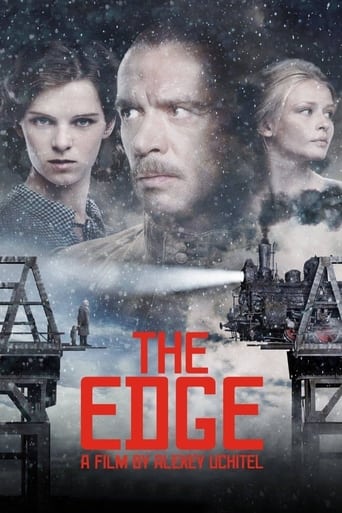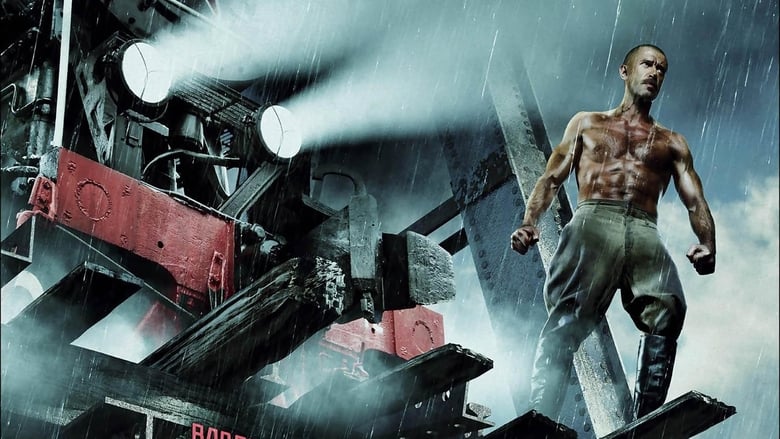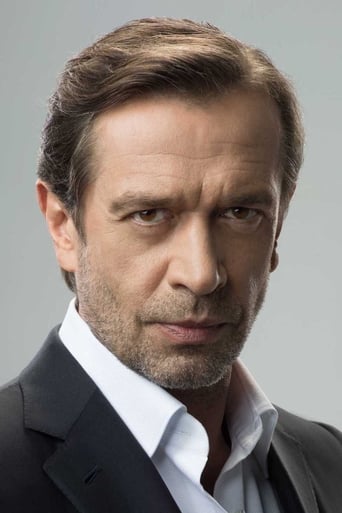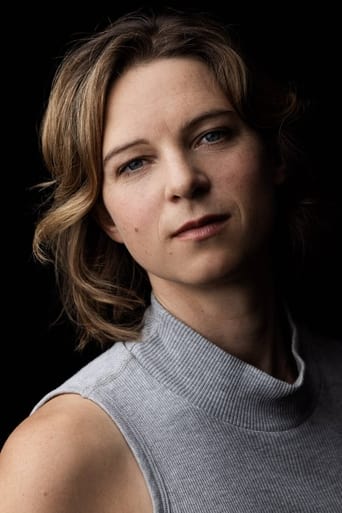The Edge (2010)
The action takes place shortly after the end of the Second World War in the Siberian hinterland, among Russians and Germans with damaged personal stories and a strange transformation: the victors seem to be crawling into the skins of the defeated, and vice versa. Ignat, is the embodiment of the larger-than-life image of the Soviet victorious warrior who, in fact, proves to be shell-shocked, sick and broken, although not completely destroyed. Trains become fetish for the heroes of the film, and speed becomes a mania; they virtually become one with their steam engines, while the machines take on human names. The heroes set up an almost fatal race in the Siberian forest, risking their own lives and those of others.
Watch Trailer
Free Trial Channels
Cast


Reviews
Well Deserved Praise
Plot so thin, it passes unnoticed.
At first rather annoying in its heavy emphasis on reenactments, this movie ultimately proves fascinating, simply because the complicated, highly dramatic tale it tells still almost defies belief.
As somebody who had not heard any of this before, it became a curious phenomenon to sit and watch a film and slowly have the realities begin to click into place.
There is little about THE EDGE that is not extremely well done. The setting and props are authentic and make you want to pull up a blanket to keep Siberia out. The photography and editing are topnotch; e.g., no lazy cameras, obnoxious close-ups, etc. All characters act according to their described circumstances. I'd bet the script is great but of course I was limited to subtitles. But the most intriguing item about THE EDGE is the plot; i.e., the storyline. Arguably the tale twists but whatever such may be the two lead characters are single-minded and riveted to their goals. The IMDb (and I assume the film's) poster picture is misleading as it suggests some superhero-like character with a Transformer-sized train. Such is decidedly NOT the case. However, the actual train devise becomes even more thrilling because of a plot predicament I won't give away. If I haven't already said so the male and female leads give awesome performances. I rarely gush so much about a movie but how THE EDGE slipped under the critics radar baffles me. Doctor Zhivago has nothing on this film. I predict great things for Anjorka Strechel.
I saw this at the 2011 Palm Springs International Film Festival. This was nominated for a Golden Globe in the Best Foreign Language Film category and was also Russia's official submission to the 83rd Academy Awards. From director Aleksei Uchitel and writer Aleksandr Gonorovsky, The Edge, which in Russian is Kray, meaning the end, was beautifully shot by cinematographer Yuri Klimenko with wonderful set staging by production designer Vera Zelinskaya. Essential to this film is the rapid fire sound by sound designer Krill Vasilenko and buffeted by a a great music soundtrack from Irish composer David Holmes. The story is set in the fall of 1945 at the close of WWII in a Siberian labor camp whose occupants harvest wood and produce charcoal to power the steam locomotives that traverse the Siberian wilderness. Ignat (Vladimir Mashkov) is a Russian war hero suffering from intense migraines who has been sent to the labor camp as a locomotive specialist. He starts up a relationship with Sofia (Yulia Peresild) by stealing her away from her fellow camp boyfriend. Ignat learns of a locomotive stranded in the woods and abandoned for years across the river. He hatches a plan to resurrect it to it's former glory in an anticipated race with his arch rival Major Fishman (Sergei Garmash) who is soon to replace the camps commander. While surveying the locomotive, Ignat encounters Elsa (Anjorka Strechel) a hostile German girl who has been living a feral life aboard the old train since the outbreak of the war. He soon enlists her help to free the locomotive and repair a bridge across the river and in doing so, becomes involved with her in a forbidden Russian-German love affair. It's been reported that writer Gornorovsky and director Uchitl collaborated on an astounding 100 rewrites to bring the script to film with rewrites going on as it was being filmed. It pays off in the final product. Filled with imagery such as the bear, the symbol of Russia, not Soviet Russia but Russia. In a metaphor, Russia the bear is eaten and stripped of it's hyde,cannibalized and crucified. The Edge is the edge of the world and the edge of human relations and human abilities. This is a powerful film like the locomotives it embraces and I would recommend it and give it a 9.0 out of 10.
I will not get into details about the movie itself - I like it a lot obviously. I will just try to answer some of the questions raised by some of the people that gave relatively low grade as they obviously did not understand a lot about the movie (probably due to bad subtitles or lack of enough attention) which I, being someone with good understanding in Russian and having quite good Bulgarian subtitles, have noticed: -This is not a Gulag! This is free labor camp - much different. People there are not imprisoned, are being cared about (clothed, fed relatively good and not harassed to death) while working for the state for something (wood harvesting and transporting I think). The idea is there the "spoiled" collaborationists to be reformed in the right attitude and habits for the "new" society.There is a train in the camp as this is the end of the railroad, this is the last station (hence the pun in the title "Kray" which in English means "End"). The locomotive is needed for keeping the railroad clean from snow during the winter and for transporting the harvested wood (second clearly seen in the movie and the first also explained in the film).The hitting is not without a reason, but it will take more than couple of lines to explain why for each case. Probably it is hard to understand for people that are not acquainted with the Russian/Soviet "Great Motherland war" (I am not sure if the translation is officially correct though) and the attitude of the whole nation towards the German invaders and the people who supported, helped or even tolerated them (especially men), especially from people who fought on the front."the main hero's girlfriend" is allowed separate room as she is the only one in the camp with a child - this is explicitly explained by her in the beginning of the movie and once again - this is not a Gulag! Please pay more attention before writing.About the train over the bridge - it is not something physically impossible. In fact the approach of rushing through an unstable construction instead of going slowly over it makes quite a sense - you pass through it in very short time before it has time to collapse and the inertia you have also helps. If you go slowly - you crush it under your weight.Overall, I believe that the atmosphere and the "flavor" of the time add the place is captured very well, and the characters are very realistic. I like Russian cinema a lot and probably being Bulgarian who grew during the socialist times and had to learn Russian since lower grades (now I don't regret this) helps me to understand and "feel"better their movies and what they are trying to say. So the movie for me is very, very good and kept me under it's impression for several days (still does). I highly recommend it, especially to people from Eastern Europe.I hope this review helps someone:)
Just after World War II, Ignat, a Soviet war hero, arrives at a Gulag camp in a remote section of Siberia, in order to try to handle a steam locomotive that is there. Soon he takes as his lover one of the prisoners, the pretty Sofia. Eventually, Ignat is told another locomotive is in an uninhabited forbidden island in a lake near the camp. When he goes to recover the locomotive, he finds a wild girl is living there, a German named Elsa who has been hiding there since the war started and the Russians killed her family (she is played by the pretty German actress Anjorka Strechel; unfortunately, it's hard to see her beauty in the movie since most of the time she is covered in dirt and dressed with shabby clothes). Ignat brings Elsa back to the camp in the broken locomotive, and soon sparks will fly between Elsa and Sofia for the love of Ignat. Since I love trains and snowy forests, I should have like this more, but it is hurt by very arbitrary plot points and a weak script. The train motif here seems a bit thrown in (why is there a train in the camp, anyway). I don't know if the portrayal of the Gulag camp is realistic, but in the movie it doesn't look as such a terrible place (when, in fact, hundreds of thousands of people if not millions die in the Gulag camps for otherwise treatable illnesses, malnutrition, exposure to the elements, etc.). Lots of Russian machismo in the movie as well, with the male characters hitting each other hard at the faintest of motives. The movie most memorable scene, that finally makes it worth watching, is a nude cat fight between Elsa and Sofia, with all the other naked woman in the camp watching.








